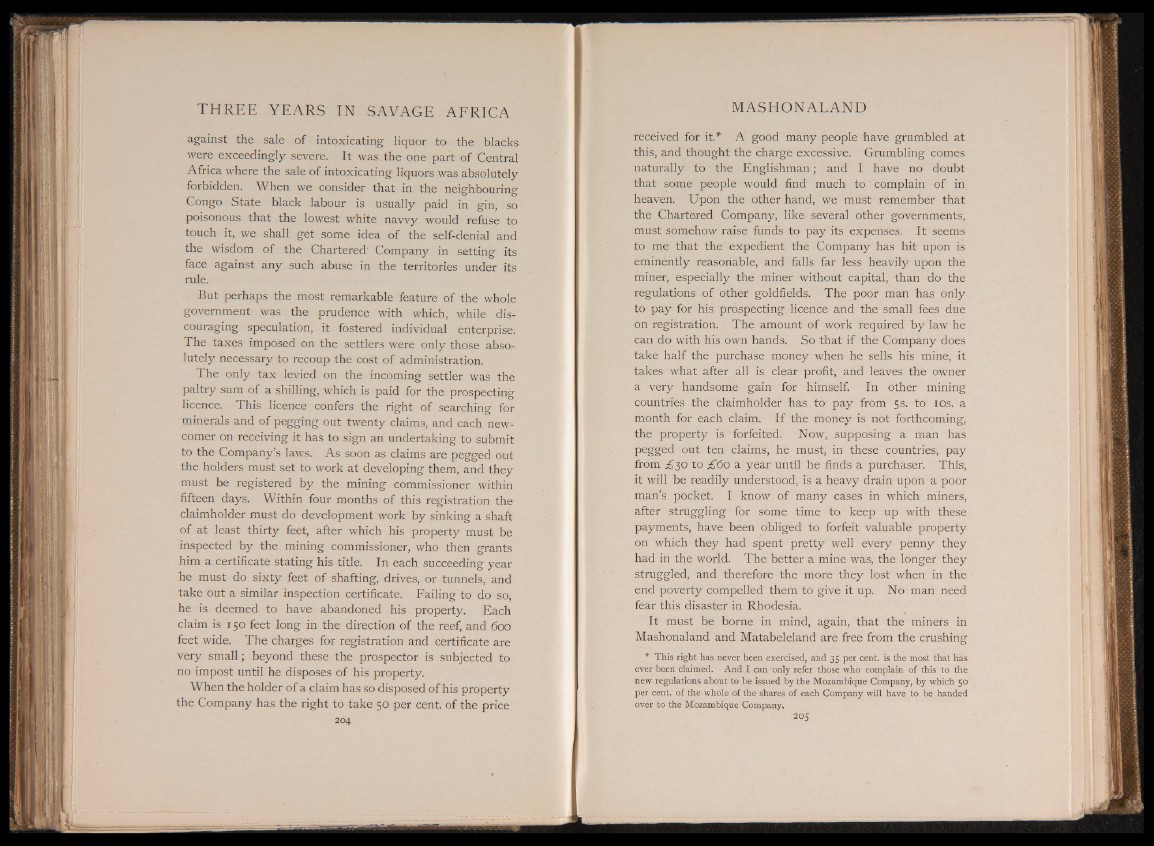
against the sale of intoxicating liquor to the black?
were exceedingly severe. It was the one part of Central
Africa where the sale of intoxicating liquors was absolutely
forbidden. When we consider that in the neighbouring
Congo State black labour is usually paid in gin, so
poisonous that the lowest white navvy would refuse to
touch it, we shall get some idea of the self-denial and
the wisdom of the Chartered' Company in setting its
face against any such abuse in the territories under its
rule.
But perhaps the most remarkable feature of the whole
government was the prudence with which, while discouraging
speculation, it fostered individual enterprise.
The taxes imposed on the settlers were only those absolutely
necessary to recoup the cost of administration.
The only tax levied on the incoming settler was the
paltry sum of a shilling, which is paid for the prospecting
licence. This licence confers the right of searching for
minerals and of pegging out twenty claims, and each newcomer
on receiving it has to sign an undertaking to submit
to the Company’s laws. As soon as claims are pegged out
the holders must set to work at developing them, and they
must be registered by the mining commissioner within
fifteen days. Within four months of this registration the
claimholder must do development work by sinking a shaft
of at least thirty feet, after which his property must be
inspected by the mining commissioner, who then grants
him a certificate stating his title. In each succeeding year
he must do sixty feet of shafting, drives, or tunnels, and
take out a similar inspection certificate. Failing to do so,
he is deemed to have abandoned his property. Each
claim is 1 50 feet long in the direction of the reef, and 600
feet wide. The charges for registration and certificate are
very small; beyond these the prospector is subjected to
no impost until he disposes of his property.
When the holder of a claim has so disposed of his property
the Company has. the right to take 50 per cent, of the price
204
received for it.*' A good many people have grumbled at
this, and thought the charge excessive. Grumbling comes
naturally to the Englishman; and I have no doubt
that some people would find much to complain of in.
heaven. Upon the other hand, we must remember that
the Chartered Company, like several other governments,
must somehow raise funds to pay its expenses. It seems
.to me that the expedient the Company has hit upon is
eminently reasonable, and falls far less heavily upon the
miner, especially the miner without capital, than do the
regulations of other goldfields. The poor man has only
to pay for his prospecting licence and the small fees due
on registration. The amount of work required by law he
can do with his own hands. So that if the Company does
take half the purchase money when he sells his mine, it
takes what after all is clear profit, and leaves the owner
a very handsome gain for himself. In other mining
countries the claimholder has to pay from 5 s. to 10s. a
month for each claim. If the money is not forthcoming,
the property is forfeited. Now, supposing a man has
pegged out ten claims, he must, in these countries, pay
from T30 to £60 a year until he finds a purchaser. This,
it will be readily understood, is a heavy drain upon a poor
man’s pocket. I know of many cases in which miners,
after struggling for some time to keep up with these
payments, have been obliged to forfeit valuable property
on which they had spent pretty well every penny they
had in the world. The better a mine was, the longer they
struggled, and therefore the more they lost when in the
end poverty compelled them to give it up. No man need
fear this disaster in Rhodesia.
It must be borne in mind, again, that the miners in
Mashonaland and Matabeleland are free from the crushing
* This right has never been exercised, and 35 per cent, is the most that has
ever been claimed. And I can only refer those who complain of this to the
new regulations about to be issued by the Mozambique Company, by which 50
per cent, of the whole of the shares of each Company will have to be handed
over to the Mozambique Company.